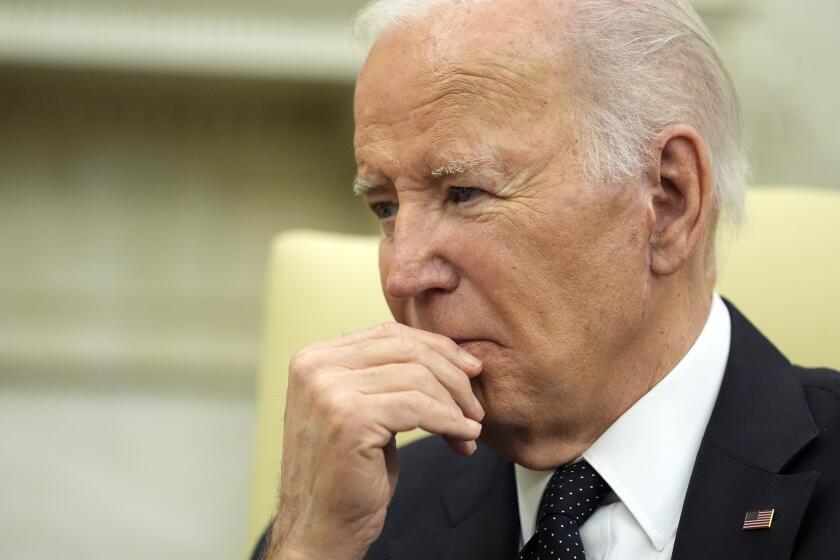Allies Urge U.S. to Make New Arms Offer
Several members of the North Atlantic Treaty Organization urged the United States on Tuesday to come up with a fresh response to the Soviet Union’s proposal for a 50% reduction in strategic nuclear weapons linked to virtual abandonment of Washington’s space defense research program.
The appeal came at a NATO briefing by Secretary of State George P. Shultz on President Reagan’s meeting Nov. 19-20 in Geneva with Soviet leader Mikhail S. Gorbachev.
Shultz, however, would go no further than a very limited comment that “we have to look at the Soviet proposals realistically and start out with what is potentially positive and what we regard as not going any place, and that is what we are doing.”
But he reassured the uneasy NATO members that the United States will not go beyond research into space defense systems without consulting its allies and negotiating with the Soviet Union.
West German Foreign Minister Hans-Dietrich Genscher told reporters he urged Shultz not to flatly reject the Soviet Union’s proposal to reduce by half the U.S. and Soviet nuclear missiles capable of striking the other’s territory. Washington considers the Soviet proposal to be a counteroffer to proposed nuclear cuts offered by the United States several years ago.
Need for Counterproposal
Genscher and other European officials said it is important that the United States, in consultation with its allies, develop another counterproposal that builds on the positive aspects of the Soviet offer.
Leo Tindemans, the Belgian foreign minister, told the NATO meeting that by presenting its new offer, the Soviet Union succeeded in giving East-West relations “a new impulse.” He also called for a new U.S. arms initiative, while stressing that he saw little value in the substance of the Soviet proposal.
Dutch Foreign Minister Hans van den Broek stressed the need for a quick American response “to keep the arms control dynamic going.”
After briefing the NATO meeting on the November summit, Shultz said the United States is sticking “to a relatively narrow interpretation” of its 1972 Anti-Ballistic Missile Treaty with the Soviet Union, even though he believes the accord does give the United States broader leeway.
Arrived from San Francisco
Shultz flew from San Francisco to the Belgian capital for the special meeting attended by foreign ministers of 10 of the 16 members of NATO to discuss the outlook for the summit.
With the summit only a month away, suggestions last week by White House national security adviser Robert C. McFarlane that the United States is considering a new interpretation of the ABM treaty to allow tests of space weapons “involving new physical concepts” caused immediate concern among the allies here that it might torpedo any arms control agreement between the superpowers.
But Shultz seemed to rule out that interpretation of the treaty, at least for now. The ABM treaty, which evolved from the first set of the first strategic arms limitation talks between the superpowers, says both the United States and the Soviet Union agree “not to develop, test, or deploy ABM systems or components which are sea-based, air-based, space-based or mobile land-based.”
Shultz said there is “universal happiness” among the allies that Reagan has reaffirmed the U.S. commitment to stick closely to the treaty and to consult with the allies and negotiate with the Soviet Union before making any change or moving on to the next stage of the Strategic Defense Initiative, known as “Star Wars.”
Genscher Satisfied
A senior West German official said that Genscher, who criticized the apparent shift in U.S. policy over the weekend, had expressed satisfaction at Shultz’s clarification.
“It is important that we stick to a consistent interpretation of the ABM treaty,” Genscher told the ministers. “This is not just a legal but also a political question. We need a political framework for the respect of the treaty.”
Shultz played down the focus on arms control as the key to the summit, and he emphasized that the ABM treaty still remains open to different interpretation.
More to Read
Start your day right
Sign up for Essential California for news, features and recommendations from the L.A. Times and beyond in your inbox six days a week.
You may occasionally receive promotional content from the Los Angeles Times.






